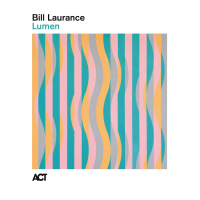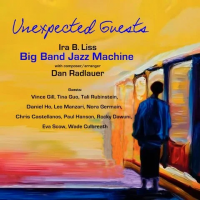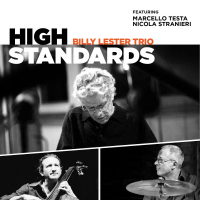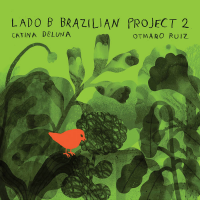Home » Jazz Articles » Album Review » New Jazz Orchestra: Le DЁҰjeuner Sur LЎҜherbe
New Jazz Orchestra: Le DЁҰjeuner Sur LЎҜherbe
In fact,
New Jazz Orchestra
band / ensemble / orchestraNeil Ardley
composer / conductorDЁҰjeuner is one of the finest British jazz records of any period. The obvious comparison in terms of its overall sonic impression has to be Gil Evans. For one thing, the absence of piano or guitar—
Frank Ricotti
vibraphoneb.1949

Michael Garrick
piano1933 - 2011

John Coltrane
saxophone1926 - 1967
Alan Cohen
b.1934
Jack Bruce
bass, acoustic1943 - 2014
 "
data-original-title="" title="">George Smith.
"
data-original-title="" title="">George Smith.Elsewhere,

Howard Riley
pianob.1943
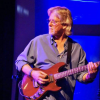
Mike Taylor
guitar"Study" was incorrectly attributed to AndrЁҰs Segovia on the original LP. Here, the composer is rightly credited as Alexandre Tansman, born in Poland but resident for much of his career in France. However, the correct title is in fact "Kolysanka No. 1—(Berceuse d'Orient)" and it is taken from Suite in Modo Polinico. It is well worth tracking down the 1958 recording by Segovia and hearing against Mike Taylor's setting here, which one suspects involved the hand of Ardley himself in its orchestration for the NJO. Taylor, and Ardley, move the piece from its original lullaby, andante cantabile setting to something much more grand and stately, more an adagio perhaps. It's impossible not to think of Sketches of Spain listening to this piece with its solos and closing duet from Henry Lowther and Barbara Thompson, here on soprano, that was often the high spot of an NJO performance. The sheer grace and elegance of "Study" is simply evocative of the open plains of Spain, its big skies and wonderful sunsets, as the piece builds from the opening statement of the scale and the simple melody derived from it, including a brief modulation up a semi-tone (I think). It's one of those performances you can bask in.
It's also worth noting here that the New Jazz Orchestra recorded a whole album of pieces by Mike Taylor in 1973, Mike Taylor Remembered, which finally achieved an official release on Dusk Fire in 2007. As for the title track, it is a minor masterpiece of form, deceptively easy on the ear but utilizing a number of different scales. Ardley's harmonic sense allows this exercise in polytonality to unfold in its own time and, while it sounds exotic in its use of modes, it never seems odd or discordant. Throughout, the playing is magnificent and it is great to hear musicians like Ian Carr, Barbara Thompson and Dick Heckstall-Smith in a big band setting. Ardley told author-pianist Brian Priestley in August 1971 that "Le DЁҰjeuner Sur L'herbe" was for him a breakthrough composition:
""Le DЁҰjeuner Sur L'herbe" was the first time I tried to compose a piece from beginning to end, with no repeating chord sequence. The tune actually comes from a secondary part in a Debussy prelude, and I used the notes in it as motifs from which the rest of the piece came. (Priestley 1971, 12)
It is very apparent from the interview that Ardley is looking outside African-American inspirations—the title of course comes from Manet's impressionist painting. Over the course of his career, Ardley would continue to expand the jazz composer's palette, as well as the instrumentation available to the composer. If Le DЁҰjeuner Sur L'herbe represents a crystallizing moment in his career, it also defines a unique period in British jazz. The lion was no longer en passant. It was rampant and it could roar. ">
Track Listing
Tracks: Le DЁҰjeuner Sur LЎҜherbe; Na?ma; Angle; Ballad; Dusk Fire; Nardis; Study; Rebirth. Rec. 1969.
Personnel
New Jazz Orchestra
band / ensemble / orchestraPersonnel: Neil Ardley conductor, director; Derek Watkins, Henry Lowther, Harry Beckett, Ian Carr trumpets; John Mumford, Derek Wadsworth, Mike Gibbs, Tony Russell trombones; George Smith tuba; Dick Heckstall-Smith, Dave Gelly, Jim Philip, Barbara Thompson woodwinds, saxophones; Frank Ricotti vibes, percussion; Jack Bruce double bass, Jon Hiseman drums.
Album information
Title: Le DЁҰjeuner Sur LЎҜherbe | Year Released: 2015 | Record Label: Dusk Fire
Tags
Comments
About New Jazz Orchestra
Instrument: Band / ensemble / orchestra
PREVIOUS / NEXT
Support All About Jazz
 All About Jazz has been a pillar of jazz since 1995, championing it as an art form and, more importantly, supporting the musicians who make it. Our enduring commitment has made "AAJ" one of the most culturally important websites of its kind, read by hundreds of thousands of fans, musicians and industry figures every month.
All About Jazz has been a pillar of jazz since 1995, championing it as an art form and, more importantly, supporting the musicians who make it. Our enduring commitment has made "AAJ" one of the most culturally important websites of its kind, read by hundreds of thousands of fans, musicians and industry figures every month.




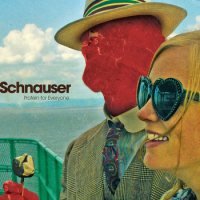



 Buy Now
Buy Now




